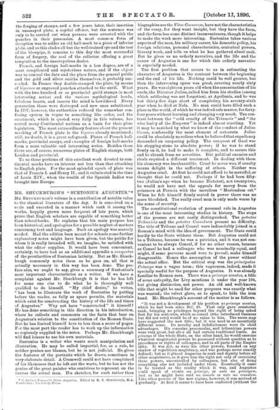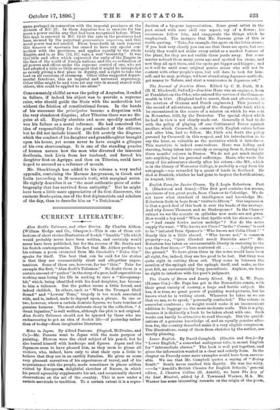MR. SHUCKBURGH'S " SUETONIUS AUGUSTUS." Mn SaucKutawa's volume is a
contribution of notable value to the classical literature of the day. It is conceived on a scale and executed in a manner which rank it among the works, happily grown more frequent of late years, which prove that English scholars are capable of something better than school-books. He explains that his main purpose has been historical, and apologises for a possible neglect of matters concerning text and language. Such an apology was scarcely needed. Had the edition been meant for schools some further explanatory notes might have been given, but the public for whom it is really intended will, we imagine, be satisfied with what the editor supplies. It would have been convenient, certainly, to have had as an additional appendix a conspectus of the peculiarities of Snetonian latinity. But as Mr. Shuck- burgh commonly notes them as he goes on, all that is actually necessary in this way has been done. The pre- face also, we ought to say, gives a summary of Saetonius's most important characteristics as a writer. If we have a complaint against Mr. Shuckbargh it is that he has left for some one else to do what he is thoroughly well qualified to do himself. "My chief desire," he writes, "has been to illustrate the work of Suetonias by putting before the reader, as fully as space permits, the materials which exist for constructing the history of the life and times of Augustus." Why not have "constructed" it himself ? He has done something in this direction in his introduction, where he collects and comments on the facts that bear on Augustus's relation to the constitution of the Roman State. But he has limited himself here to less than a score of pages. For the most part the reader has to work up the information so copiously supplied in the notes. Perhaps Mr. Shackburgh will find leisure to use his own materials.
Snetonius is a writer who wants much manipulation and dlustration. He may be called impartial, for, as a rule, he neither praises nor blames, but he is not judicial. He gives the features of the portraits which he draws, sometimes in very elaborate detail. A Cromwell could not have complained of his likenesses that he left out the warts, but he has not the genius of the great painter who contrives to represent on the canvas the actual man. His sketches, for such rather than
• C. Suetoai Trampulti Mous Augustus. Edited by E. S. Shaekbargb, Cambridge : Umvers.ty Pt (.63, biographies are the Vitae Caesarean, have not the characteristics of the essay, for they want insight, but they have the form,
and the form has some distinct inconveniences, though it helps to make the work more interesting. Saetonius takes various aspects of the man, his military career, his domestic policy, his foreign relations, personal characteristics, oratorical powers, literary work, and tells us what he has gathered about' each.
But he gives us no orderly narrative, and the life and the career of Augustus is one for which this orderly narrative is especially needed.
The first problem that occurs to us in estimating the character of Augustus is the contrast between the beginning
and the end of his life. Nothing could be well greater, but then the intervening space was great, covering nearly sixty years. He was eighteen years old when the assassination of his
uncle, the Dictator Julius, called him from his studies (among which soldiering was not forgotten), at Apollonia, and he was but thirty-five days short of completing his seventy-sixth year when he died at Nola. No man could have filled such a place in the world, of which he was indeed sole master, for forty- four years without learning and changing very much. The con-
trast between the "cold cruelty of the Triumvir" and "the wise lenity of the Emperor" is indeed almost startling. Yet it may be matched by what we know of the conduct of Jalins Cwsar, confessedly the most clement of autocrats. Julius could be absolutely merciless when he believed that expediency demanded an unsparing policy. The conquest of Gaul was his stepping-stone to absolute power; if he was to stand firmly on it, he had to make it complete, and to secure this end he shrank from no severities. But political enemies and rivals required a different treatment. In dealing with them
his clemency was inexhaustible. Cruel he never was, if cruelty means delight in the suffering of others. Neither was Au gustus cruel. At first he could not afford to be merciful, or thought that he could not. Perhaps if he had been fifty- two (Julius's age when be became Dictator), not twenty-two,
he would not have met the appeals for mercy from the prisoners at Perusia, with the merciless " Iforiendum eat." When he felt himself firmly seated in power there was no more bloodshed. The really cruel man is only made worse by the sense of security.
The constitutional evolution of personal rule in Augustus is one of the moat interesting studies in history. The steps of the process are not easily distinguished. The potestas Tribunicia and the potestas Consularis present no difficulty. The title of Tribune and Consul were indissolubly joined in a
Roman's mind with the idea of government. The State could hardly be the State without them. But Augustus could not be a Tribune, because he was a patriciaA and it was:not con- venient to be always Consul, if for no other reason, because as Consul he had a colleague who was nominally equal, and might, if some perverse mood were to prevail, make himself
disagreeable. Hence the assumption of the power without the actual office. But the critical step was the principatus Princeps was a vague term ; this vagueness, indeed, made it specially useful for the purpose of Augustus. It was already familiar to Roman ears. There was a princeps senatus, a title
of some antiquity, for Livy mentions it under the year 194, but giving distinction, not power. An old and well-known title that might be used for other purposes was exactly what was wanted ; the velvet glove, so to speak, to hide the iron hand. Mr. Shuckburgh's account of the matter is as follows.
"It was not a development of his position as princeps senatus, which he had been since B.C. 28. That only gave senatorial rank, bringing no privileges beyond the right of being asked first for his sententia, which as consul (who introduced business but did not vote) would be of no value to him. The name may have suggested the new title; but it was used in an essentially different sense. Its novelty and indefiniteness were its chief advantages. His consular, proconsular, and tribunician powers were very great, but after all had certain traditional limits. As princeps of the whole State, on the other band, he would exercise whatever magisterial powers he possessed without question as to precedence or rights of colleagues, and in all parts of the Empire alike. It VIM not, as were his other powers, founded on any shadow of republican magistracy, and was perhaps never exactly defined; but as it placed Augustus in rank and dignity before all other magistrates, so it gave him the right not only of exercising those powers, uncontrolled by colleagues, but also of doing everything else not included under them. Eventually it came to be treated as the reality which it was, and Augustus could speak of events me principe, or ante me principem, just as he might have said me consuls or ante me consulem. Like other powers of the new regime, however, it was arrived at gradually. At first it seems to have been conferred (without the name perhaps) in connection with the imperial provinces at the division of B.C. 27. In them Augustus was to exercise for ten years a power unlike any that had been recognised before. When this Apxi is renewed in B.C. 19-18 the rule in the provinces had been secured by the perpetual proconsulare imperium, and this novel power was not needed. From henceforth at each renewal this iryepor:a or wpocrracria has ceased to have any special con- nection with the provinces, and applies equally to the whole Empire, and is, as Dio [53, 16] says, a real' monarchy.' It was this title and office which expressed the unity of the Empire in the face of the world of foreign nations, and the co-ordination of all powers and offices under the supreme control of one, who yet had adopted a title so little arrogant that it might be interpreted as merely giving a first place in dignity, and a right to take the lead on all occasions of ceremony. Other titles suggested depart- mental functions, this an imperial and universal supremacy. Other titles might be and were (at any rate in name) shared with others, this could be applied to one alone."
Consummately skilful as was the policy of Augustus, it ended in failure, if indeed his object was to provide a supreme ruler, who should guide the State with the moderation but
without the friction of constitutional forms. In the bands of his successor the principatus became a despotism with the very slenderest disguise; after Tiberius there was no dis- guise at all. Equally absolute and more speedily manifest
was his failure as a moral reformer. He had conceived the idea of responsibility for the good conduct of the citizens, but he did not include himself. He felt acutely the disgrace which the conduct of his daughter and granddaughter brought upon his house, yet seems never to have caught a glimpse of his own shortcomings. It is one of the standing puzzles of human nature how the man who divorced the innocent
Scribonia, took Livia from her husband, and forced his daughter first on Agrippa and then on Tiberius, could have hoped to succeed as a reformer of morals.
Mr. Shuckburgh has added to his volume a very useful appendix, containing the Marmor Ancyranum, in Greek and Latin (according to- Mommsen's text), with marginal notes.
He rightly describes it as "the most authentic piece of auto- biography that has survived from antiquity." But he might have been a little more appreciative of its first diScoverer, the eminent Busbeq nine, one of the first diplomatists and scholars of the day, than to describe him as "a Dutchman."







































 Previous page
Previous page